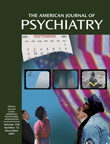Cannabis Abuse as a Risk Factor for Depressive Symptoms
Abstract
OBJECTIVE: This study sought to estimate the degree to which cannabis abuse is a risk factor for depressive symptoms rather than an effort to self-medicate depression. METHOD: Participants (N=1,920) in the 1980 Baltimore Epidemiologic Catchment Area (ECA) study who were reassessed between 1994 and 1996 as part of a follow-up study provided the data. The analysis focused on two cohorts: those who reported no depressive symptoms at baseline (N=849) and those with no diagnosis of cannabis abuse at baseline (N=1,837). Symptoms of depression, cannabis abuse, and other psychiatric disorders were assessed with the Diagnostic Interview Schedule. RESULTS: In participants with no baseline depressive symptoms, those with a diagnosis of cannabis abuse at baseline were four times more likely than those with no cannabis abuse diagnosis to have depressive symptoms at the follow-up assessment, after adjusting for age, gender, antisocial symptoms, and other baseline covariates. In particular, these participants were more likely to have experienced suicidal ideation and anhedonia during the follow-up period. Among the participants who had no diagnosis of cannabis abuse at baseline, depressive symptoms at baseline failed to significantly predict cannabis abuse at the follow-up assessment. CONCLUSIONS: Further research is needed to identify characteristics of individuals who abuse cannabis that account for their higher risk of depression to estimate the degree of impairment resulting from their depression.



